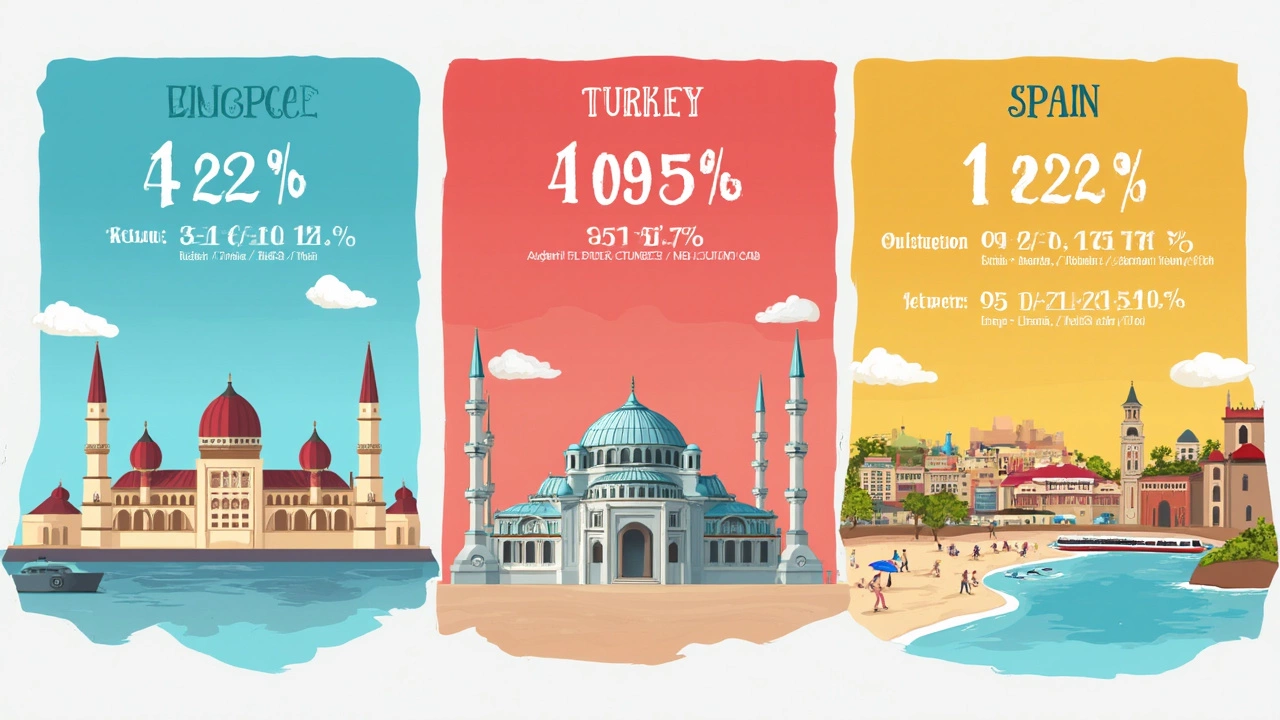
Looking at dental implant prices in the UK feels like paying for a new car, doesn’t it? That’s why so many people are packing their bags and heading somewhere cheaper in Europe. Dental tourism isn’t just a buzzword—it’s the reason flights to places like Budapest, Istanbul, and Warsaw are packed with new smiles.
Before you book anything, get clear on a simple thing: dental implant prices can be drastically different depending on the country. In some spots, you could pay less than half what you’d face at a UK clinic. Sounds tempting, but there’s more to the story. It’s not just about the bottom line—you want your new teeth to last. Cheap isn’t always good, but smart savings absolutely are. Let’s look at where your money goes furthest and what catches to watch out for.
- How Dental Implant Costs Compare Across Europe
- Popular Countries for Affordable Implants
- Quality and Safety: Getting the Best for Your Money
- Hidden Costs and What’s Included
- Tips for UK Patients Considering Dental Treatment Abroad
How Dental Implant Costs Compare Across Europe
Walking into a UK dentist and asking about dental implants Europe can deliver a real shock. On average, a single tooth implant in the UK lands somewhere between £2,000 and £2,800. That’s before counting extras like abutments, crowns, or post-op check-ups. So it’s no wonder people start googling European options before even leaving the clinic.
The price gap across Europe is huge. In Hungary, for example, the same implant work often costs between £700 and £1,000 per tooth. Poland is in the same ballpark—sometimes a touch cheaper. Head to Turkey and you’ll see prices dip closer to £500-£800 for one implant. Even Spain and Portugal, which feel pretty familiar for holidaymakers, offer package deals under £1,200 an implant.
| Country | Average Cost (GBP per implant) |
|---|---|
| UK | £2,200 |
| Hungary | £900 |
| Poland | £800 |
| Turkey | £650 |
| Spain | £1,100 |
Why are things so different? It’s not about lower quality. The big cost drivers are wage differences, clinic running costs, and even tax policies. Countries with lower living costs can offer great cheap dental implants and still turn a profit. Plus, there’s a bit more competition in some European cities thanks to booming dental tourism. Places that see a steady flow of UK and Irish patients often keep prices attractive to bring in new faces.
When comparing prices, don’t just check a website’s headline number. Double-check what’s included. Sometimes, low prices only cover the implant itself—leaving out the crown, consultation, or post-surgery X-rays. The full “all-in” costs matter if you want to compare apples with apples. No one wants sticker shock when it’s time to pay the final bill.
Popular Countries for Affordable Implants
If you search for dental implants Europe or "cheap dental implants," certain countries pop up every single time. Hungary, Poland, Turkey, and Spain are at the top of almost every list for one reason: prices are way lower than in the UK, with clinics that regularly see international patients.
Hungary is basically the epicenter of dental tourism in Europe. Clinics in Budapest attract thousands of UK patients every year. Why? Expect prices around £800-£1,000 per implant (including the crown), compared with the UK's average starting point of £2,500. Clinics there are used to working with Brits—some even throw in airport transfer and hotel pick-up as part of the deal.
Poland is right behind, with Warsaw and Krakow leading the way. Prices here are pretty tempting, often ranging from £700-£1,000 per implant, with strict rules about clinic hygiene and dentist qualifications. Many Polish dentists train in Western Europe, so quality control is basically baked in.
Turkey is making a name for itself, too, besides cosmetic procedures. Dental implants here can cost as little as £500-£900, and clinics in Istanbul and Antalya cater to tourists with package deals that add up. The flight may be longer, but the savings can cover your holiday and the treatment.
If you prefer to stay a bit closer, Spain is worth a look. Cities like Barcelona and Madrid are big on affordable tooth replacement. You can get an implant for around £1,000-£1,200. Sunshine as a bonus doesn’t hurt, and many clinics offer consultations in English.
Here's a quick price breakdown for a single dental implant (including crown):
| Country | Typical Cost per Implant (GBP) | Popular Cities |
|---|---|---|
| Hungary | £800 - £1,000 | Budapest |
| Poland | £700 - £1,000 | Warsaw, Krakow |
| Turkey | £500 - £900 | Istanbul, Antalya |
| Spain | £1,000 - £1,200 | Barcelona, Madrid |
| UK | £2,000 - £2,800 | London, Manchester |
When you’re comparing, remember: the flight and stay are extra but often still make the whole thing cheaper than doing it at home. Always double check what's included in the advertised price. Some places throw in more than others, so ask about X-rays, check-ups, and warranty before you get excited by a low number.

Quality and Safety: Getting the Best for Your Money
If you’re chasing cheap dental implants in Europe, you’re probably wondering if you’ll sacrifice safety or end up with a dentist who cuts corners. Here’s the real deal—it’s possible to save big while still getting excellent care, but you need to know what to look for.
First, check if the clinic and dentist are fully licensed and accredited. The best clinics in places like Hungary, Poland, and Turkey often welcome international clients, so they tend to highlight their qualifications online. Look for memberships in organisations like the European Association for Osseointegration or even the UK’s General Dental Council. Many reputable dental clinics post patient reviews and before-and-after photos. Read those with a critical eye and don’t be shy about asking direct questions to the clinic.
Next is the technology and materials used. Believe it or not, many clinics abroad use the exact same implant brands as top clinics in London or Manchester—think Nobel Biocare, Straumann, or Astra Tech. If a clinic offers no-name implants or won’t share details, that’s a red flag. Ask about the type of implant and any warranty included (a lot will offer a 5 to 10 year warranty).
Let’s talk infection control and hygiene standards. Top clinics often let you see their sterilisation area or explain their protocols. In Hungary, for example, health authorities inspect dental clinics regularly and hygiene rules are strict. In Turkey, clinics aiming at foreign patients usually follow international standards to stay competitive. Still, you should always ask:
- How do they sterilise their instruments?
- What’s the clinic’s complication or failure rate?
- How much training do their surgeons have in dental implants Europe procedures?
Here’s a quick comparison of common implant success rates in Europe, based on published clinic data:
| Country | Average Success Rate |
|---|---|
| Hungary | 95-98% |
| Poland | 96-98% |
| Turkey | 94-97% |
| UK | 96-99% |
One last thing—always confirm the aftercare. Good clinics usually include at least one follow-up check, sometimes more. Others might give you written instructions and emergency contacts for problems when you’re home again. If all they offer is cheap, quick treatment and goodbye, move on.
Saving money on dental implants UK doesn’t have to mean taking risks. Stick to famous brands, check every qualification, and insist on clear, simple answers to your questions. That’s how you get a bargain without regrets.
Hidden Costs and What’s Included
Think the price you spot for dental implants Europe on a clinic’s website is the real deal? It might not tell the whole story. A lot of clinics advertise a basic rate, but once you land in the dental chair, extra charges can sneak up—and your final bill may look nothing like the price tag you saw online.
Let’s break down what’s usually included in a package and where you need to keep your eyes peeled for add-ons:
- Initial consultation: Sometimes free, but in some countries like Spain or Italy, you might pay €50-€80 just to get checked.
- 3D imaging (CBCT scans/X-rays): Often not part of the basic implant price. Expect €50-€150 per scan if it’s extra.
- Implant post: Usually included. This is the ‘root’ part that’s anchored in your jaw.
- Abutment and crown: Pay extra attention here—some clinics separate these from implant placement, which can add €300-€600.
- Anesthesia/sedation: Local anesthesia is typically included, but IV or general sedation could cost €100-€400 more.
- Temporary teeth: If your treatment takes months, temp teeth can add €100-€400 per tooth.
And don’t forget the stealthy costs you might not see coming:
- Travel and accommodation: Even if your cheap dental implants save thousands, flights and hotels can still eat up your savings.
- Follow-up visits: Most European clinics include one check-up—but anything beyond that, especially if you need adjustments back home, comes out of your pocket.
- Bone grafts or sinus lifts: If your jawbone’s not thick enough, this extra work could pile on €200-€1,500+ depending on complexity.
To make all this crystal clear, here’s how a typical price can stack up:
| Item | Expected Cost (€) | Usually Included? |
|---|---|---|
| Implant post | 700–1,100 | Yes |
| Abutment | 250–400 | Sometimes |
| Crown | 250–600 | Sometimes |
| CBCT Scan | 50–150 | No |
| Temporary Tooth | 100–400 | No |
| Anesthesia (IV) | 100–400 | No |
| Bone Graft | 200–1,500 | No |
Tip: Always ask for a dental treatment quote in writing, and make sure it clearly says what’s included and what could come extra. If a deal looks suspiciously cheap, check reviews from UK patients—hidden costs pop up more often than you think.

Tips for UK Patients Considering Dental Treatment Abroad
If you’re a UK patient eyeing dental implants Europe offers for much less than what you’d pay at home, being prepared is everything. Saving money is great, but you want the whole process to go smoothly—no surprises, no regrets.
Start by checking out clinics that have a solid track record with British patients. Look for Google reviews, testimonials, and before-and-after photos from actual people, not just staged ones. The hotter the destination (think Hungary, Poland, or Turkey), the more likely you’ll find English-speaking staff and even UK-trained dentists.
- Ask for full price breakdowns. Don’t get caught by bargain ads that only mention the implant screw, but not the crown, abutment, or consultations. Get itemized quotes in writing.
- Check their implant brands. Reputable clinics use well-known manufacturers—brands like Straumann, Nobel Biocare, or Ankylos are big names in the industry. This matters if you ever need maintenance or work done back in the UK.
- Look into guarantees. Some clinics give a 3- to 5-year guarantee on their affordable tooth replacement work. Ask exactly what’s covered and if aftercare is included—flying back for a loose screw is no fun.
- Understand the process timeline. Implants often happen in two trips: first visit for the screw, a healing wait of 3-6 months, then a return for the crown. Sort your travel and time off around this.
- Sort out your own aftercare in the UK. Most NHS clinics don’t fix problems from private or overseas dental work. Line up a local dentist willing to do check-ups in case you need it.
To see how price compares at a glance, here’s an idea of what you might pay for a single cheap dental implant (implant + abutment + crown) in 2025:
| Country | Average Total Cost (GBP) | Number of UK Dental Tourists Annually |
|---|---|---|
| Hungary | £900 - £1,100 | ~20,000 |
| Turkey | £700 - £950 | ~15,000 |
| Poland | £950 - £1,200 | ~8,000 |
| UK (private) | £2,000 - £2,800 | - |
Make sure your travel insurance actually covers medical tourism. Most standard policies won’t. Read the small print and consider specialist insurance just for peace of mind.
Finally, check if your chosen clinic supports aftercare chats online or has a UK-based rep. Time zones, language, and travel can complicate fixes, so keep those WhatsApp details handy just in case. Research, double-check, and don’t rush. That way, your dental implants UK search turns into a winning smile, not a headache.